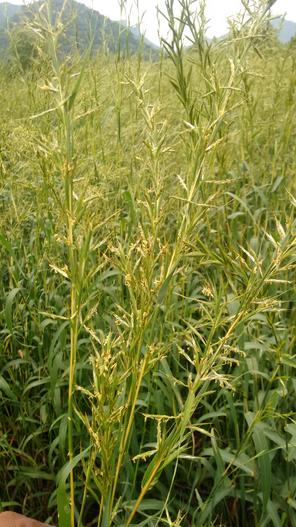Palmarosa
(Cymbopogon martini)
Palmarosa (Cymbopogon martini)
/
/

Agasthiar1
CC BY-SA 4.0
Image By:
Agasthiar1
Recorded By:
Copyright:
CC BY-SA 4.0
Copyright Notice:
Photo by: Agasthiar1 | License Type: CC BY-SA 4.0 | License URL: https://creativecommons.org/licenses/by-sa/4.0 | Uploader: Agasthiar1 | Publisher: Wikipedia Commons



Estimated Native Range
Summary
Cymbopogon martinii, commonly known as Palmarosa, is a perennial grass native to the Indian subcontinent and parts of Southeast Asia. It typically grows up to 10 feet tall and has a pale green color with a thin, strong stem. Palmarosa is characterized by its long, slender leaves and aromatic compound flowers that bloom in a branched inflorescence. The essential oil derived from this plant has a sweet, floral fragrance reminiscent of roses, which is why it’s often used in perfumes and cosmetics. The flowering season for Palmarosa is late summer to fall, and while the flowers are not particularly showy, they are valued for their oil content.
Palmarosa is cultivated for its oil, which is used in a variety of products including soaps, perfumes, and skin care items. It is also used in traditional medicine for its purported therapeutic properties. In agriculture, Palmarosa is often intercropped with crops like pigeon pea, millet, or sorghum to enhance soil quality and increase yields. This grass prefers full sun and thrives in sandy soils with good moisture levels. It requires regular watering, especially in dry conditions, but is generally low-maintenance once established. Palmarosa is not known for being invasive or having significant disease problems, making it a reliable crop for essential oil production.CC BY-SA 4.0
Palmarosa is cultivated for its oil, which is used in a variety of products including soaps, perfumes, and skin care items. It is also used in traditional medicine for its purported therapeutic properties. In agriculture, Palmarosa is often intercropped with crops like pigeon pea, millet, or sorghum to enhance soil quality and increase yields. This grass prefers full sun and thrives in sandy soils with good moisture levels. It requires regular watering, especially in dry conditions, but is generally low-maintenance once established. Palmarosa is not known for being invasive or having significant disease problems, making it a reliable crop for essential oil production.CC BY-SA 4.0
Plant Description
- Plant Type: Grass
- Height: 6-9 feet
- Width: 3-4 feet
- Growth Rate: Moderate
- Flower Color: N/A
- Flowering Season: Spring, Summer
- Leaf Retention: Evergreen
Growth Requirements
- Sun: Full Sun
- Water: Medium
- Drainage: Medium, Fast
Common Uses
Fragrant, Low Maintenance, Street Planting
Natural Habitat
Native to the Indian subcontinent and parts of Southeast Asia
Other Names
Common Names: Palmarosa Grass, Geranium Grass, Lu Sha Xiang Mao, Motia Grass, Motiya, Rosha, Rosha Grass, Rusa Grass
Scientific Names: , Cymbopogon martini, Andropogon calamus-aromaticus, Andropogon martini, Andropogon martini, Andropogon pachnodes, Andropogon pachnoides, Andropogon schoenanthus var. martini, Andropogon schoenanthus var. martini, Cymbopogon lanceifolium
GBIF Accepted Name: